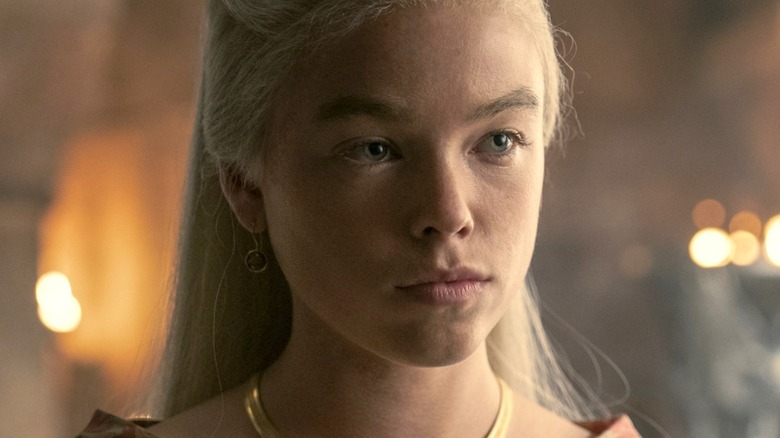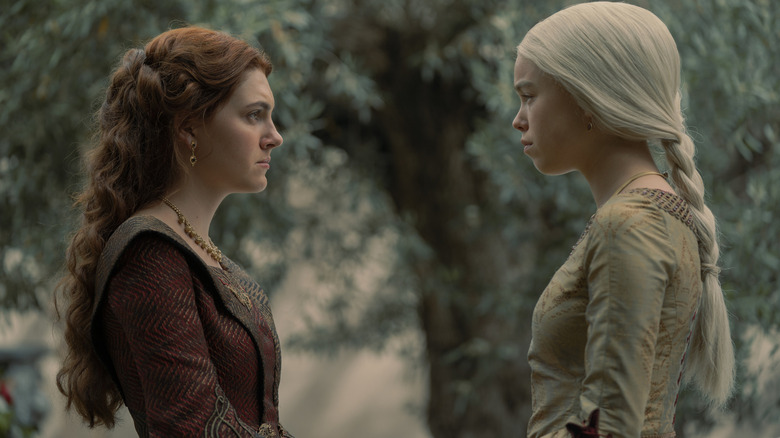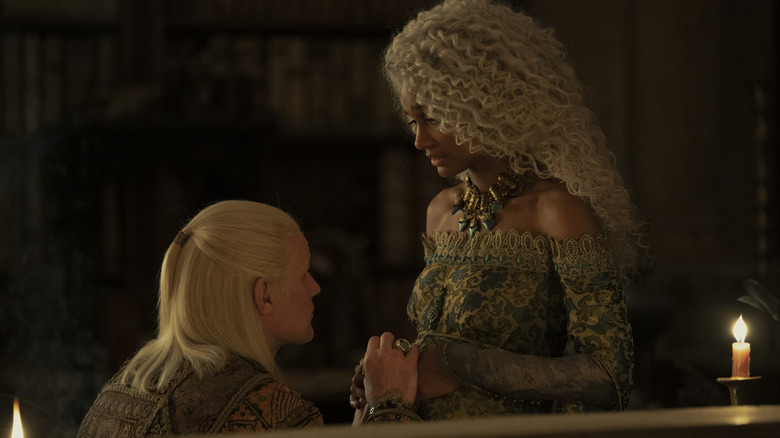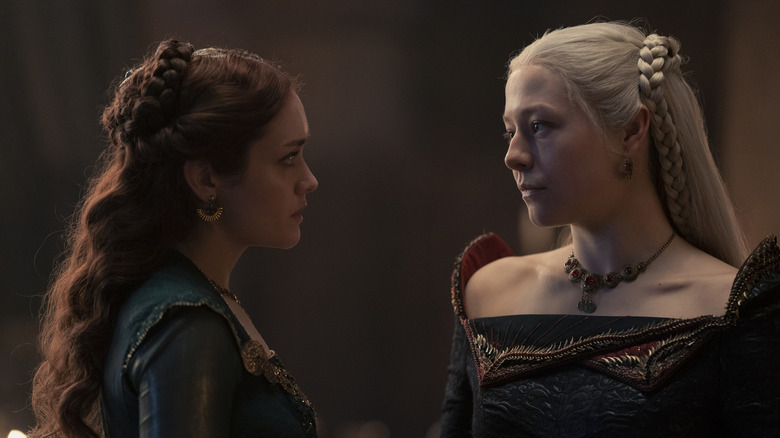House Of The Dragon Tries To Fix Game Of Thrones' Problems With Women - But Just Finds New Ones
It's not exactly original or groundbreaking to state, at this point, that "Game of Thrones" didn't always give its female characters a fair shake. Sure, Emilia Clarke's Daenerys Targaryen started the series as an iconic hashtag girl boss with three baby dragons and a go-getter attitude, but once tons of fans named their daughters after her, showrunners David Benioff & D.B. Weiss drew back the curtain to reveal that she was basically Hitler, but if he had dragons. Lena Headey's Cersei Lannister was once one of the most complex female antiheroes on television and then closed out the show by standing near a window and dying while sobbing, thanks to a thoroughly avoidable pile of falling rocks. Sophie Turner's Sansa experienced a journey of serious highs and lows alongside some pretty spectacular character growth, but also says that years of brutalization and assault made her into a better, stronger person by the end. These examples merely scratch the surface, ultimately.
So how does that show's prequel and first spin-off, "House of the Dragon," factor into this unsettling trend set by its predecessor? Well, it certainly makes some sort of attempt to right the wrongs created by "Game of Thrones," but halfway into its first season, it's actually ended up creating entirely new problems. Here's how "House of the Dragon" is trying to fix the problems with women "Game of Thrones" featured... and just finds new ones.
House of the Dragon focuses on strong female characters... kind of
Even before "House of the Dragon" hit the small screen in August of 2022, its marketing made it very clear that the show, unlike "Game of Thrones," would feature its female characters front and center. Enter Rhaenyra Targaryen — played by Milly Alcock as a teenager and Emma D'Arcy as an adult — a headstrong dragonrider who, as the only child to King Viserys I (Paddy Considine), is named the official heir to the Iron Throne, which would make her the first woman to rule the Seven Kingdoms. Viserys, to his credit, doesn't reverse this decision even when he has two sons with his much younger wife Alicent Hightower (Emily Carey as a teen, Olivia Cooke as an adult), but Rhaenyra is extraordinarily aware that her position is precarious at best.
As a teen, Rhaenyra is plagued with the knowledge that, as Rhaenys Targaryen (Eve Best), the infamous "Queen Who Never Was" that was passed over for her cousin Viserys, tells her, men would rather watch the realm "burn" than see a woman sit upon the Iron Throne. Alicent, meanwhile, is hyper-aware thanks to her father Otto (Rhys Ifans) that, if Rhaenyra wants to retain her claim to the throne, she may well do away with Alicent's sons to strengthen that very claim. "House of the Dragon" definitely wants audiences to see Alicent and Rhaenyra as incredibly powerful female characters, but... are they really?
Not only does the show pit its two main female characters against each other rather than allying them for some sort of shared goal, it also puts them smack in the middle of a patriarchal system that they both adhere to — especially Alicent, who is essentially used as a sexual pawn by her own father without any resistance. Are Rhaenyra and Alicent actually powerful, or is it just a faux feminist facade? "House of the Dragon" really wants us to believe that it's a story about strong women, but it falls back on far too many tropes and still centers a male-driven system above all else.
Violence against women runs rampant throughout House of the Dragon
The sixth episode of "House of the Dragon," entitled "The Princess and the Queen," focuses on the strife between Alicent and Rhaenyra, and when it comes to the latter, it opens on a close-up of her pain-stricken face during childbirth. This isn't the first scene depicting childbirth on "House of the Dragon," but it's the least deadly — which is a pretty low bar to clear, especially since this scene, where Rhaenyra immediately drags herself and her wrecked post-birth body across the Red Keep to show her child to a demanding Alicent, is pretty harrowing to watch in and of itself.
As of this writing, two women have died during childbirth on "House of the Dragon" — Rhaenyra's own mother Aemma (Sian Brooke), who endures a surprise C-section performed without her consent that causes her to bleed out, and an adult Laena Velaryon (Nanna Blondell), who chooses self-immolation via dragon when her birthing process takes the same turn as Aemma's (namely, a baby in breech). Notably, both of these women died in the very first episode in which they appeared — though younger version of Laena were featured in other episodes, this was Blondell's first turn as the character — much like Rhea Royce (Rachel Redford), who is killed by her own husband Daemon Targaryen (Matt Smith) in her first ever scene.
Where can House of the Dragon go from here?
"House of the Dragon," at this point, really wants to have it both ways: the show wants to earn some nebulous feminist accolades while also showcasing brutal violence against women, especially where childbirth is concerned. Two women dying from pregnancies gone horribly wrong within just six episodes is probably part of what season 1 showrunner and director Miguel Sapochnik meant when he said he wanted to keep the series accurate to the "time period," which he later made clearer while addressing Aemma's death in the aftermath of the pilot by saying this was a time without adequate medical care where this fate befell women more often than not.
That's all well and good, but it still begs the question: do we need to see it on screen, and does "House of the Dragon" need to brutalize women in this way? Audiences know that childbirth is dangerous; using two female characters as literal human sacrifices just twists the proverbial knife. Sure, the series gives us an apparent alternative to the social mores of the time in Rhaenyra, a sexually free and frank woman who takes lovers for her own pleasure multiple times — but when it comes down to it, Rhaenyra, who as a teenager staunchly does not want children, delivers three boys, presumably because her society demands it. Rhaenyra might have a sheen of girlbossery about her, but she and Alicent are still both ultimately powerless, and that fact is unavoidable, no matter how much this show wants us to ignore it.
The sexual violence on "House of the Dragon" has, so far, been used as a plot device far less than during "Game of Thrones," but dangerous pregnancies, an irreversibly patriarchal system, and two women in a war of attrition all work together to make sure that this series has created some all new problems where its female characters are concerned. Generations before Daenerys would torch King's Landing because she was mad about something, it seems that her ancestors may ultimately receive the same disappointing character assassinations.



